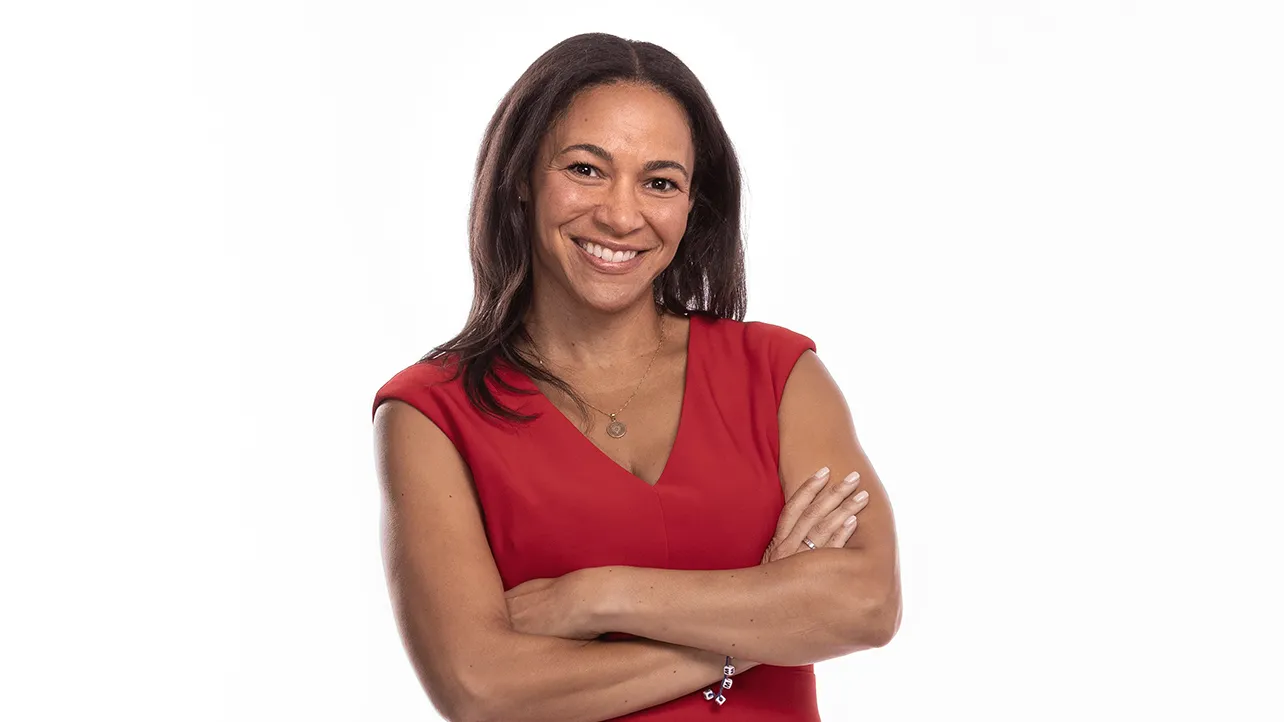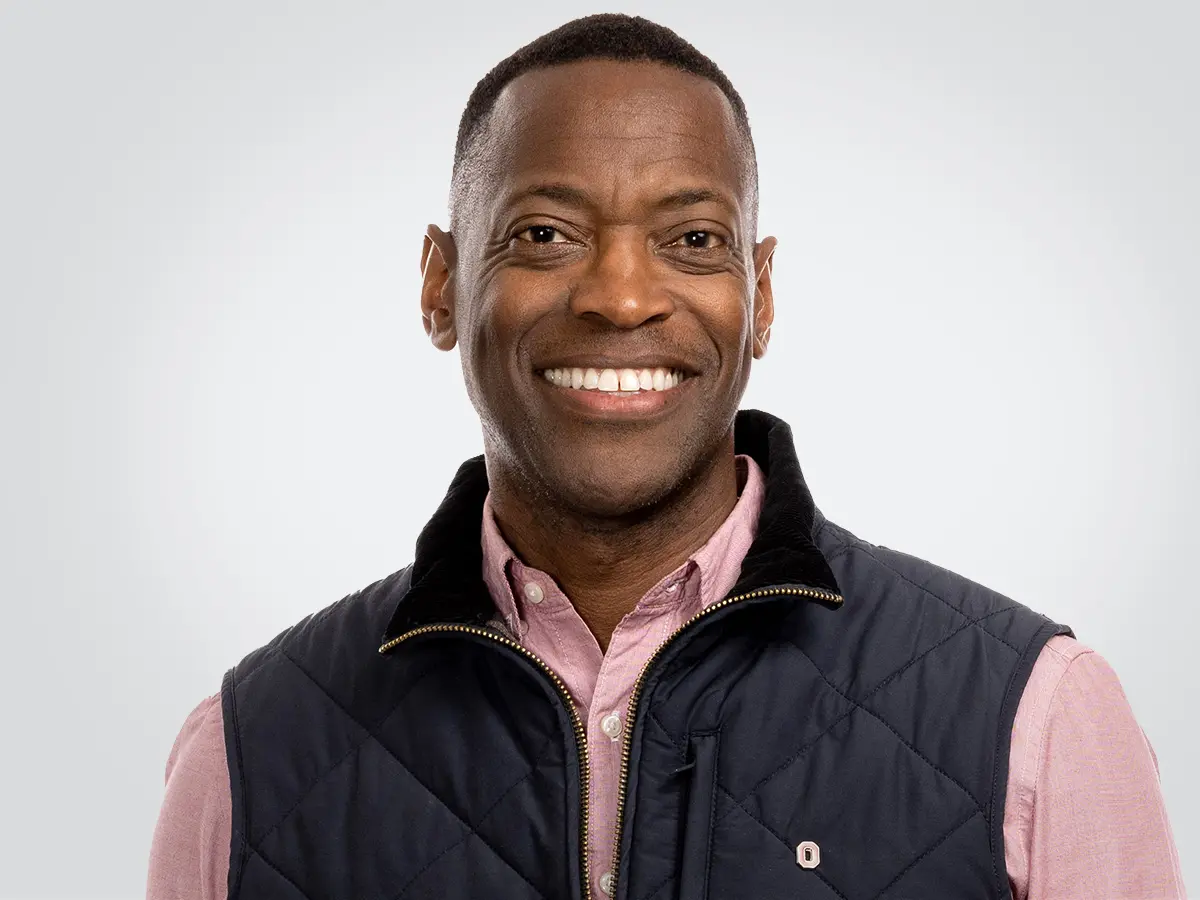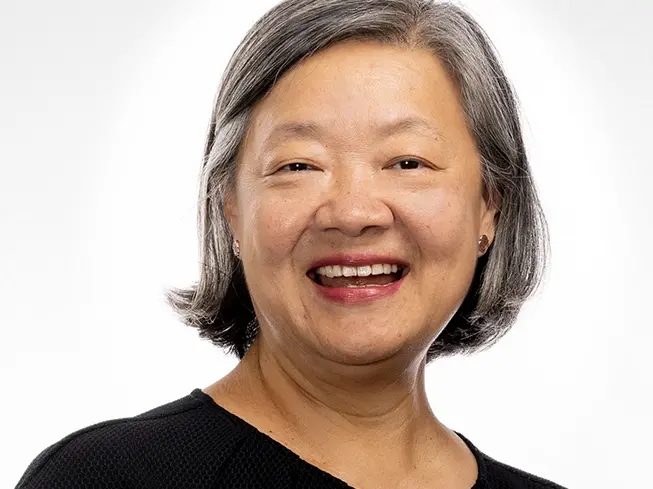Wherever she goes, Emily Schriver finds potential
An alumni board member, a TBDBITL veteran, a mom of 3 girls — this Buckeye has a deep love for Ohioans and helps get them elected.

Emily Quick Schriver is CEO of The Matriots, a nonpartisan political action committee that helps get women elected. (Photo by Jodi Miller)
Emily Quick Schriver ’05 excels at connecting people and ideas. Few could draw parallels between preparing for a difficult case or conversation and taking the field with The Best Damn Band in the Land — but she can, speaking from experience.
“First, you have to listen,” Schriver says. “Take a few deep breaths and stick to your script. My job is to move through, not minding the chaos, and I practice enough to know exactly where to go.”
This mindset has served her well throughout her distinguished career as an attorney, which included more than six years as in-house counsel for The Ohio State University, advising leaders on a billion-dollar research portfolio. Her current role is CEO of The Matriots, a nonpartisan organization that is advancing women’s equal participation in all aspects of political life in Ohio.
Beyond her work, Schriver is personally passionate about a representative government reflecting the people.
“My goal in life is to make the world a more equitable, fair, safe and just place, especially for my own three daughters,” she says.
-
Tell us about being a member of Ohio State’s marching band — and about Mortimer.
The marching band is a real gem for the university. It’s steeped in history, honoring and preserving traditions for Ohio State, yet it always evolves, showing what progress can look like. I remember the excitement during rehearsals and going out to perform, when you hear the drums and start counting. It’s incredibly loud. There are tiny circles painted on the ramp and ground before you get to the grass, to tell you where to plant your foot and turn sharply. You have to pay close attention while other band members are yelling directions.
My husband, John Schriver ’02, and I met as students in the band, so it was a very formative experience! He played the trumpet, and I had my trusty trombone. The way you might name a car, it became “Mortimer.” These days, it’s rare that Mortimer makes an appearance, though John and I did march with the alumni band this year.
-
What do you appreciate about your time on the board?
It is a great way for alumni to engage with each other and the campus, and then to think more broadly about how we might individually or collectively leave a legacy. That’s a real gift to those of us on the board — and hopefully others are able to see that through us. We uncover how people connect with Ohio State, what were and are their meaningful experiences. Then we translate that into better serving current and future students.
I think a lot about how the different constituencies served by the university — students, faculty, staff, alumni, the community and government — are all held in balance. One decision can tug on one of the others; the push and pull affects everybody. For example, if we succeed amazingly, like a faculty member earning the Nobel Prize, that raises the profile of the university, benefiting all.
-
What is another one of your most meaningful student experiences?
Being a student member on The Ohio State University Board of Trustees probably helped shape who I am today and my career path more than anything else. It was remarkable, at that age, to have exposure to incredible decision-makers, people who are at the top of their careers in different fields, who see the world through different lenses and have honest and thoughtful dialogue. We saw the ways in which the university operates and were involved in making critical decisions — we weren’t left out of conversations.
-
When did you decide to become a lawyer?
As a student trustee, I interacted with lawyers for the first time. I was fortunate to learn alongside Robert Duncan ’48, ’52 JD, who was the first African American to serve on the Ohio Supreme Court and later decided the Columbus schools’ historic desegregation cases, and Ginny Trethewey ’77 JD and Chris Culley ’76, who were leaders in the Office of Legal Affairs.
I just loved watching the way they thought about problems, taking a challenging question and breaking it down into its component parts and solving each piece separately. It could be the biggest issue facing Ohio State, and they were able to calmly enter the fray and think about the issue from all different sides. When I finished my undergraduate degree in Fisher College of Business, with a minor in music, I went immediately to law school.
-
Tell us about leading The Matriots.
We all stand on the shoulders of the people who came before us. I think of trailblazing women, like Jo Ann Davidson, who changed Ohio politics and the lives of everyday folks. She was the first woman speaker of the Ohio House of Representatives and also served on the board when I was a student trustee. It was a real benefit to have her perspective.
The Matriots tries to demystify politics, because it shouldn’t be confusing. We make it simple to answer, “When do you file?” and “Where do you go to become a candidate?” Our organization recognizes that when women are not at the table, they’re not part of the discussion, and therefore policies and legislation are not reflecting them. We invest in their campaigns and lift up their voices.
I have a deep love for Ohio. Its geopolitical diversity is fascinating. We have five regions that act very differently when they go to vote, but when you balance that against the real people of Ohio, you see how we look out for each other even when we don’t agree. If you’re sick, somebody makes you a casserole. Slip and fall, and somebody’s starting a meal train. We are the nicest people at our core.


